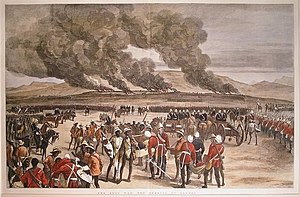Our website is made possible by displaying online advertisements to our visitors.
Please consider supporting us by disabling your ad blocker.
Battle of Ulundi
This article includes a list of general references, but it lacks sufficient corresponding inline citations. (October 2014) |
| Battle of Ulundi Battle of kwaNodwengu Battle of oCwecweni[1] | |||||||
|---|---|---|---|---|---|---|---|
| Part of Anglo-Zulu War | |||||||
 The Burning of Ondini | |||||||
| |||||||
| Belligerents | |||||||
|
| Zulu Kingdom | ||||||
| Commanders and leaders | |||||||
|
| Ziwedu kaMpande[2] | ||||||
| Strength | |||||||
|
4,200 British[a] 1,000 Africans 2 Gatling Guns 10 cannons | 12,000–15,000[b] | ||||||
| Casualties and losses | |||||||
|
13–18 killed[3] 69–89 wounded[c] |
473 killed[d] 1,000+ wounded[e] | ||||||
The Battle of Ulundi took place at the Zulu capital of Ulundi (Zulu: oNdini) on 4 July 1879 and was the last major battle of the Anglo-Zulu War. The British army broke the military power of the Zulu nation by defeating the main Zulu army and immediately afterwards capturing and burning the royal kraal of oNdini.
- ^ Laband 2009, pp. 292–294, page 293, Ulundi, Battle of (1879).
- ^ Laband 2009, pp. 5–6, Anglo-Zulu War (1879).
- ^ Knight 2005, p. 59.
Cite error: There are <ref group=lower-alpha> tags or {{efn}} templates on this page, but the references will not show without a {{reflist|group=lower-alpha}} template or {{notelist}} template (see the help page).
Previous Page Next Page


